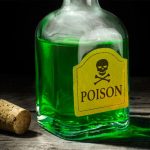A substance which can kill or harm body tissues if eaten or drunk.
Substance that when inhaled, ingested, or absorbed impairs health or causes death.
Any substance that irritates, damages, or impairs the activity of the body’s tissues. In large enough doses almost any substance acts as a poison, but the term is usually reserved for substances, such as arsenic, cyanide, and strychnine, that are harmful in relatively small amounts.
Any substance which, if absorbed by, introduced into or applied to a living organism, may cause illness or death. The term ‘toxin’ is often used to refer to a poison of biological origin. The study of the effects of poisons is known as toxicology.
Any substance taken into the body by ingestion, inhalation, injection, or absorption that interferes with normal physiological functions. Virtually any substance can be poisonous if consumed in sufficient quantity; therefore the term poison more often implies an excessive degree of dosage rather than a specific group of substances. Aspirin is not usually thought of as a poison, but overdoses of this drug kill more children accidentally each year than any of the traditional poisons.
A compound that, in minor quantities, disturbs the arrangement and/or operation of cells.
A substance, whether biological or chemical, that is harmful to the body.

